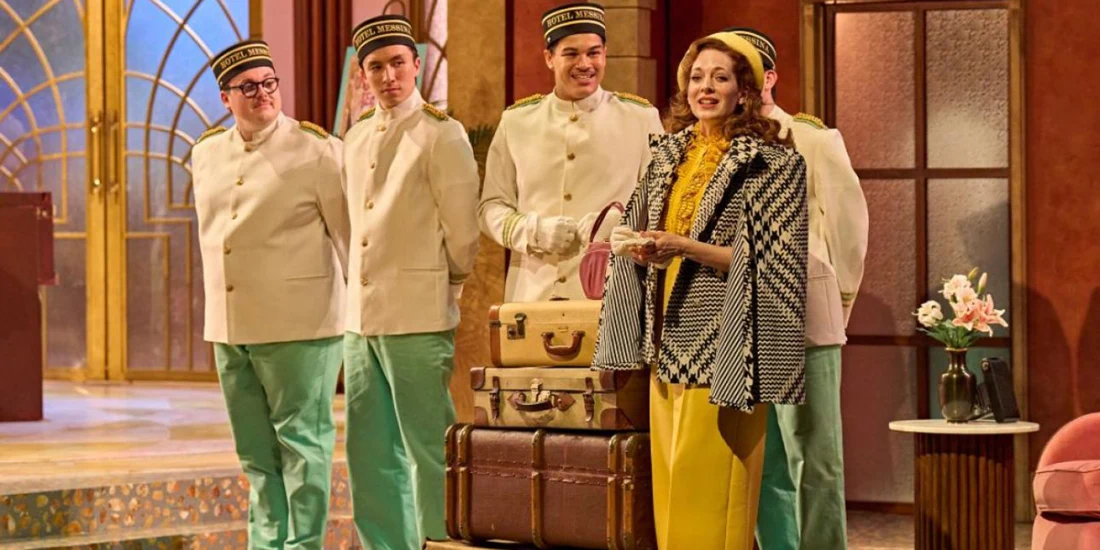'Much Ado About Nothing' review — delectable fun in the sun with Shakespeare's sparring lovers
Central London in this scorching weather is a miserable business, so why not escape to the Italian Riviera? In fact, Simon Godwin’s delectable production of Much Ado About Nothing looks, sounds and probably even tastes so good (the latter thanks to a judiciously deployed gelato cart) that you just want to dive in headfirst and never leave.
This beautifully detailed updating transports Shakespeare’s play to a seaside hotel in Sicily, the Messina, in a fantasy 1930s. It’s managed by Leonato and his wife Antonia (instead of his brother Antonio – an effective switch). When General Don Pedro and his soldiers visit, two love stories play out: Claudio shyly courts Hero, while Benedick and Beatrice resume their bristling jousts.
One of the most luminous adaptations of Much Ado is Emma Thompson and Kenneth Branagh’s sun-kissed 1993 movie, shot in Tuscany, and Godwin’s production has some of that radiant charm. It’s thoroughly effective for a play that shifts tone dramatically, as the darker developments catch us all by surprise – surely not in a place this heavenly? But we come to understand that there is misogyny and vengeance lurking beneath the beauty and chivalric courtship.
That beguiling dreaminess is reinforced by the sublime Art Deco set from Anna Fleischle, which is almost musical in its movement – a central revolve whisking around like a carousel, various rooms whooshing out of the floor or across the stage. It’s a symphony of mint green and dusky pink, Evie Gurney’s costumes either perfectly matched or deliberate standouts, as when Katherine Parkinson’s rebellious Beatrice strides into the hotel in mustard yellow and a houndstooth coat.
Parkinson is a natural for the sardonic Beatrice, delivering her putdowns with steely intent; it’s evident that she’s been wounded in the past and is determined to get her blows in first. She and John Heffernan’s Benedick begin their opening sparring match at either side of the stage and gradually draw close until they’re nose to nose, neither willing to back down. Immediately, there’s a heat between them too – that irresistible romcom set-up.
Heffernan is a superb Benedick, cooking up inventive line readings that create a complex portrait: a gentle soul beneath the bluff military man, full of contemptuous certainty and then utterly, gloriously felled by love. His “gulling” scene sees him rise from under a gelato cart, covered in ice cream and hundreds and thousands, as though reborn through dessert. Heffernan constantly finds that sweet spot between farce and genuine emotion, and riffs brilliantly off the audience too.
But then Godwin’s entire production is a feast of ideas, giving us a new point of interest in every scene – whether an exuberant social dance featuring a swing band, feathered fans, Charleston and a little Fred and Ginger moment for Hero and Claudio (wonderful movement direction throughout by Coral Messam), or a beach set-up with striped changing tents and a hammock just made for pratfalls. Crucially, each supports the text rather than overwhelming it.
This is that rare Shakespeare production that zips by with barely a lull. That’s due to a universally strong company, including Ashley Zhangazha bringing authority and a mellifluous voice to Don Pedro; Rufus Wright, as Leonato, unravelling in heartbreaking fashion; and Eben Figueiredo (following his Christian in Cyrano, cornering the market in young lovers) retaining his South London twang for a believably callow Claudio.
Even the Dogberry scenes – often interminable – become comic highlights thanks to the impeccable physical work of David Fynn, who at one point slides down a wall as though melting from the inside out (probably not a stretch in this weather). Likewise Phoebe Horn makes some bold comic choices for Margaret that elevate her from mere plot device.
Though Parkinson could do more with the slapstick, she and Ioanna Kimbook commit sincerely to the drama of the doomed wedding. Kimbook makes that scene entirely Hero’s – her disbelief, fury, despair – and she ensures that Claudio earns his way back into her favour. Parkinson’s subsequent tirade, and her palpable desire to be a man so that she could avenge her cousin, is a searing moment. The creation of the Antonia character also gives women more of a voice here. She gets the line that rings out in the age of #MeToo: “I will be heard!”.
But Godwin always retains the balance of a play which is, at heart, a hopeful comedy – and a lustful one. Margaret can barely keep her hands off Brandon Grace’s Borachio, who rips off his uniform and makes his pecs dance, and even Beatrice and Benedick can’t reason their way out of their physical attraction to one another.
Nor can they deny the awe-inspiring nature of their ardour. When Heffernan admits “I do love nothing in the world so well as you: is not that strange?”, he imbues that declaration with sheer wonder. This whole production is a wonder too, and you will be just as helpless to resist.
Much Ado About Nothing at the National Theatre to 10 September.
Photo credit: Much Ado About Nothing at the National Theatre (Photo by Manuel Harlan)
Originally published on
